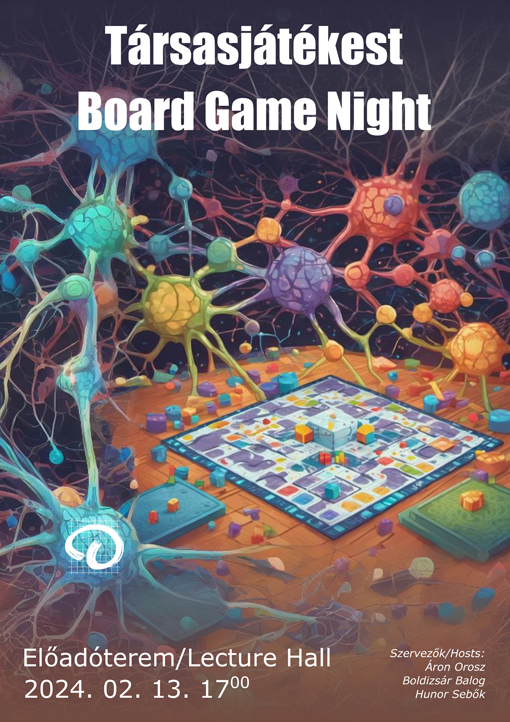Homo Ludens or Game in the KOKI
In the first week of February, a pretty poster appeared in the elevators of KOKI, followed by a circular inviting everyone to a board game night. The so far unthinkable event took place on 13 February, and the next one will be on 4 March.
We can't let this one pass without a word! The HUN-REN KOKI is a leading institute for brain research and was recognized by the members of the international committee that visited us a few weeks ago. How does a board game club come here? There are several reasons to explain why Ars Sacra Nova has been holding its choir rehearsals here for years, and the music and dance closing of the year after the official Christmas celebrations is understandable, but why should our mainly young staff come to the institute loaded with board games, and then play all kinds of board games with young and not so young researchers from 5 p.m. to late10 p.m.?  Indeed, that is exactly what has happened, and this activity has at least as much sense and benefit as the previous ones. But let's not play with words here, let's get some facts!
Indeed, that is exactly what has happened, and this activity has at least as much sense and benefit as the previous ones. But let's not play with words here, let's get some facts!
The Dutch cultural historian and Indologist Johan Huizinga - incidentally, who is also an honorary member of the Hungarian Academy of Sciences (1936) - defines play in his book Homo Ludens, which is the basis of the science of play, as "a free activity which is quite consciously outside 'everyday' life, as 'non-serious', but which at the same time absorbs the player intensely and completely." Later, in the 21st century, new formulas and definitions have evolved, but these, even those relating to computer games, complement rather than supersede the former. Let's not go into the role of play in development and survival in the animal world, but let's just say that its importance is not only essential for the healthy development of a child but that a healthy adult must also have a predisposition and a sense of play. Playing together helps us to get to know each other, build teams, release hidden energies, and generate ideas that can be used in research, too. Anyone who wants to become a researcher can only be Homo Ludens, i.e. a playful person. At least, Professor Győző Bruckner, although he made his mark in organic chemistry, always reminded his students of this in his very first lecture.
János Neumann would certainly have confirmed his claim, not only as the founder of mathematical game theory but perhaps also because, in addition to his doctorate in mathematics from the University of Sciences in Pest, he also obtained a degree in chemical engineering from the University of Applied Sciences in Zurich in 1926 - certainly for the sake of games.
Back to the present, it is worth mentioning that children and real players always take the game seriously, so Áron Orosz, Boldizsár Balog, and Hunor Sebők, the organizers of the board game night, not only attached a nice poster to the invitation but also a serious questionnaire, so that both the organizers and the participants could be prepared. Showing the risk-taking befitting the game, our management also got in on the action. Not only did they allow it, but they also provided some ammunition for the participants, knowing full well that the brain is the organ that needs the most energy.
And although I don't think Attila József's famous poem "Air" was recalled when permission was granted, its closing line will do here: "let your beautiful, serious son play!"





